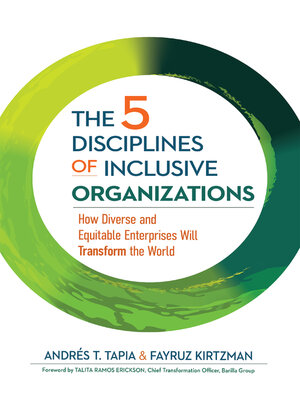The 5 Disciplines of Inclusive Organizations
ebook ∣ How Diverse and Equitable Enterprises Will Transform the World · The Five Inclusive Disciplines Series
By Andrés T. Tapia

Sign up to save your library
With an OverDrive account, you can save your favorite libraries for at-a-glance information about availability. Find out more about OverDrive accounts.
Find this title in Libby, the library reading app by OverDrive.



Search for a digital library with this title
Title found at these libraries:
| Library Name | Distance |
|---|---|
| Loading... |
A comprehensive new model for creating inclusive organizations, illuminating the vital role that inclusion plays in developing solutions to the critical social, environmental, and leadership challenges we face.
Most organizational DE&I efforts are focused on changing individual behaviors. But unless you change the organizational structures-the practices, processes, and systems that surround and support individual behaviors-your change efforts will not take root. Structural inclusion makes behavioral inclusion stick.
Andrs Tapia and Fayruz Kirtzman have found that five disciplines encompass the structures, mindsets, behaviors, and accountabilities required for creating inclusive organizations that will have transformational impact not only on their culture and people but also on society and the planet:
1: Manage the Risk: know how to deal with the legal, reputational, and cultural risks of either doing the wrong thing, or not doing the right thing.
2: Explode the Awareness: make sure leaders and employees are deeply informed about, and publicly committed to, the value of DE&I.
3: Maximize the Talent Systems: ensure that leaders and managers display inclusive behaviors when they manage and optimize talent.
4: Master the Logistics: integrate DE&I into operations in ways that lead to improved efficiencies.
5: See the Marketplace: expand to new consumer market segments, enhance cross culturally competent customer service, and form effective partnerships with overlooked communities.
The authors provide assessment tools and case studies of organizations that have implemented each discipline, highlighting what worked and what tripped them up. And they take a wider view, showing how inclusive organizations practicing the five disciplines can address what they call society's four vital tasks: diversify leadership, eradicate polarization, achieve justice, and save the planet. This is a complete guide to how to make your organization a systematic, process-oriented engineer of change for the full range of your stakeholders.
Most organizational DE&I efforts are focused on changing individual behaviors. But unless you change the organizational structures-the practices, processes, and systems that surround and support individual behaviors-your change efforts will not take root. Structural inclusion makes behavioral inclusion stick.
Andrs Tapia and Fayruz Kirtzman have found that five disciplines encompass the structures, mindsets, behaviors, and accountabilities required for creating inclusive organizations that will have transformational impact not only on their culture and people but also on society and the planet:
1: Manage the Risk: know how to deal with the legal, reputational, and cultural risks of either doing the wrong thing, or not doing the right thing.
2: Explode the Awareness: make sure leaders and employees are deeply informed about, and publicly committed to, the value of DE&I.
3: Maximize the Talent Systems: ensure that leaders and managers display inclusive behaviors when they manage and optimize talent.
4: Master the Logistics: integrate DE&I into operations in ways that lead to improved efficiencies.
5: See the Marketplace: expand to new consumer market segments, enhance cross culturally competent customer service, and form effective partnerships with overlooked communities.
The authors provide assessment tools and case studies of organizations that have implemented each discipline, highlighting what worked and what tripped them up. And they take a wider view, showing how inclusive organizations practicing the five disciplines can address what they call society's four vital tasks: diversify leadership, eradicate polarization, achieve justice, and save the planet. This is a complete guide to how to make your organization a systematic, process-oriented engineer of change for the full range of your stakeholders.







